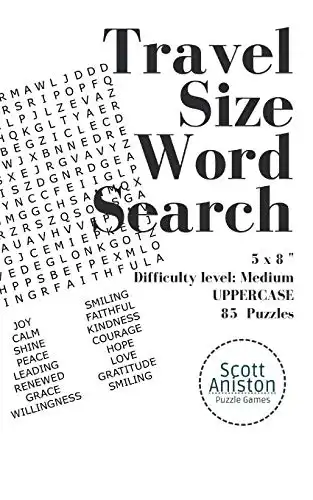The fear of flying is called aerophobia, and it’s quite common. Personally, even the thought of boarding an aircraft causes a pang of anxiety in me.
However, this is one fear that is rewarding to overcome. Your world can literally open up tremendously once you get more comfortable with air travel.
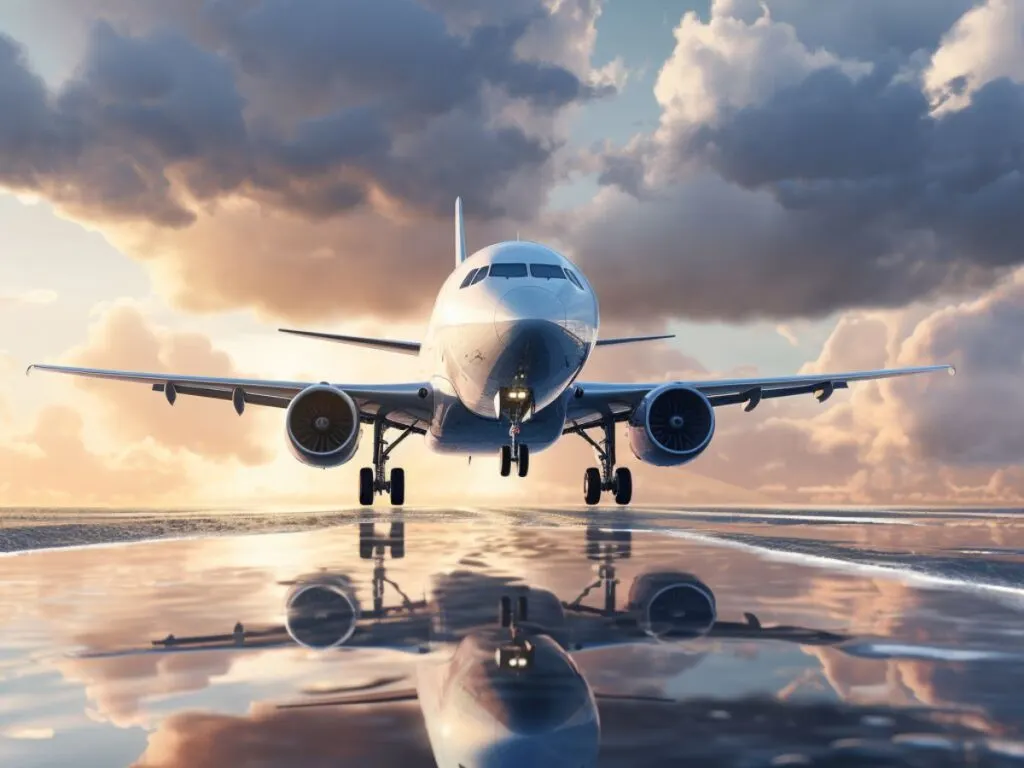
Understanding the Fear of Flying
As with most things in life, understanding the root cause of your fear is an important key. Once you’ve identified the triggers and factors that cause your anxiety, you can work on strategies to tackle each concern.
Know that you are far from alone in this journey to overcome the fear of flying. Definitely seek out others in support groups or forums to learn more tips and tricks that people share to help them fearlessly fly!
Different Phobias Related to Flying
The fear of flying can possibly consist of several phobias intertwined within this fear. That’s right, we’ve got a whole bonus package going on here.
First, there’s aviophobia or aerophobia, which both refer to an intense fear of being on an aircraft. You may also experience acrophobia, which is the fear of heights. And, perhaps, toss in a little claustrophobia, which is the fear of tight spaces.
For me, I also have a little bit of fear of passing out and fear of vomiting once I board a plane. Once you pinpoint each concern, you can address each one and develop relevant coping strategies.
Anxiety and Panic Attacks
If you have an anxiety disorder or frequent panic attacks, the fear of flying can definitely push that to another level. Being aware of your anxiety disorder and knowing your triggers and symptoms is important when trying to overcome your fear.
Psychological Triggers
Fear of flying can be triggered by various psychological factors. These triggers might include feeling vulnerable in an aircraft, claustrophobia (fear of enclosed spaces), loss of control, or the possibility of an accident or crash.
Identifying the specific triggers that cause your fear can help you develop targeted coping techniques, such as exposure therapy, relaxation techniques, and even seeking professional help, like therapists specialized in aerophobia.
Once you drill down to recognize and understand the root cause of your fear, whether it’s a phobia, anxiety disorder, or psychological trigger, you’ll be better equipped to manage and eventually conquer your fear of flying.
Causes and Factors Contributing to the Fear
Lack of Control and Trust
One common factor that causes a fear of flying is the lack of control and trust. Personally, I think this is the biggest factor for me. You have to sit there and rely on the pilots and airline staff to keep you safe on the flight.
If you already have a hard time trusting people or a general fear of heights, this is a huge challenge. It’s easy to feel vulnerable or anxious when you have zero control over the situation. Not that I would feel any better with ME behind the plane.
I try to connect with any of the staff that’s present while boarding the plane. I’ve gone as far to ask the pilot if he had a good night’s sleep the night before. I’ve also told flight attendants that I’m a nervous flyer. Even the littlest bit of exchange with the other humans can put my mind at ease a tad!
Another helpful thing to do is learn about the aviation industry and the strict safety measures that they have in place. Also, remember that the pilots have lives and families to get back to, as well. They want to get home safely just like the rest of us!
Fear of Turbulence and Crashes
Another big fear factor is being afraid of turbulence and plane crashes. While the odds of being in a plane crash are extremely low, the media’s portrayal of accidents is enough to amp up your anxiety.
Keep in mind that turbulence is a natural and normal part of flying. Planes are built to withstand an intense amount of turbulence.
It can be helpful to give yourself a refresher on the statistics. We’ve probably all been told that flying is one of the safest forms of travel and rolled our eyes. But, there are stats to back that up, so read them to help your brain store them as a fact.
Claustrophobia and Confined Spaces
Claustrophobia is yet another reason some people panic on a plane ride. Being in an enclosed cabin for an extended period of time can cause discomfort, especially if you aren’t a fan of tight spaces. Here are some things to do to manage these issues:
- Choose a specific seat: Opt for an aisle seat or an exit row seat to give yourself a bit more room, and reserve your seat as early as possible.
- Distract yourself: Engage in activities that can take your mind off the confined space, such as watching movies, reading, or listening to music.
- Practice relaxation techniques: Breathing exercises, meditation, or progressive muscle relaxation can help ease your anxiety in confined spaces.
Keep these factors in mind as you work on overcoming your fear of flying, and remember that millions of people fly safely every day.
Dealing with Fear of Flying through Knowledge
Understanding Flight Safety Statistics
One effective way to deal with your fear of flying is by understanding the safety statistics related to air travel. When you compare flying with other modes of transportation, such as cars, trains, and buses, you’ll find that flying is actually the safest form of long-distance travel. In fact, dying from a plane accident is extremely rare.
To put things in perspective, here are some key facts and figures:
- The odds of being involved in a fatal plane crash are around 1 in 11 million.
- In comparison, the odds of being involved in a fatal road accident are approximately 1 in 5,000.
- Commercial aviation sees a continuous decrease in fatal accidents, with 2020 having the lowest number of accidents in history.
Learning about Aviation Safety Measures
Another strategy to cope with your fear of flying is to become familiar with the various safety measures in place within the aviation industry. Knowledge about these safety precautions can help you feel more secure and confident about your journey.
- Aircraft design and maintenance: Modern aircraft are designed with advanced materials and systems to ensure high levels of safety. Airplanes undergo rigorous maintenance checks and procedures to detect and fix any issues.
- Pilot training and certification: Pilots undergo extensive training and must pass strict tests and exams to be certified. Additionally, they undergo recurrent training to ensure they stay proficient in their skills.
- Air traffic control: A sophisticated system of communication, navigation, and surveillance technology helps pilots and controllers maintain safe and efficient airways.
- Safety regulations and audits: Aviation organizations, such as the Federal Aviation Administration (FAA) and International Civil Aviation Organization (ICAO), establish and enforce safety regulations, while airlines are subject to audits to ensure compliance.
Pro-tip: Try to tune into the air traffic control center while you are on the flight. This was a really long time ago, but I was on a flight once and was able to listen to everything the pilot was saying as we flew. This was beyond helpful to me. His calm voice while reporting our flight kept my mind at ease!
Preparing for the Flight
Choosing the Right Seat
When you book your flight, pay attention to the seat assignment. It’s the aisle seat for me! That’s what I am going for. Being in the aisle makes me feel like I have more freedom. Of course, if I can get the exit row, that feels like first class, but that’s usually hard to get!
Sitting over the wings is said to provide a smoother ride during turbulence. This is one aspect of the flight you can usually control, so figure out where you are most comfortable and do what you can to get the seat you want.

Creating a Relaxation Plan
Before your flight, create a relaxation plan for yourself. How do you normally relax and unwind? Add those familiar activities that help you stay calm to your plan.
Practice deep breathing exercises, meditation, listen to calming music or ASMR on your headphones, or whatever works for you.
Read a book, watch a movie or show, play games, or anything that helps keep your mind busy in a calming way.
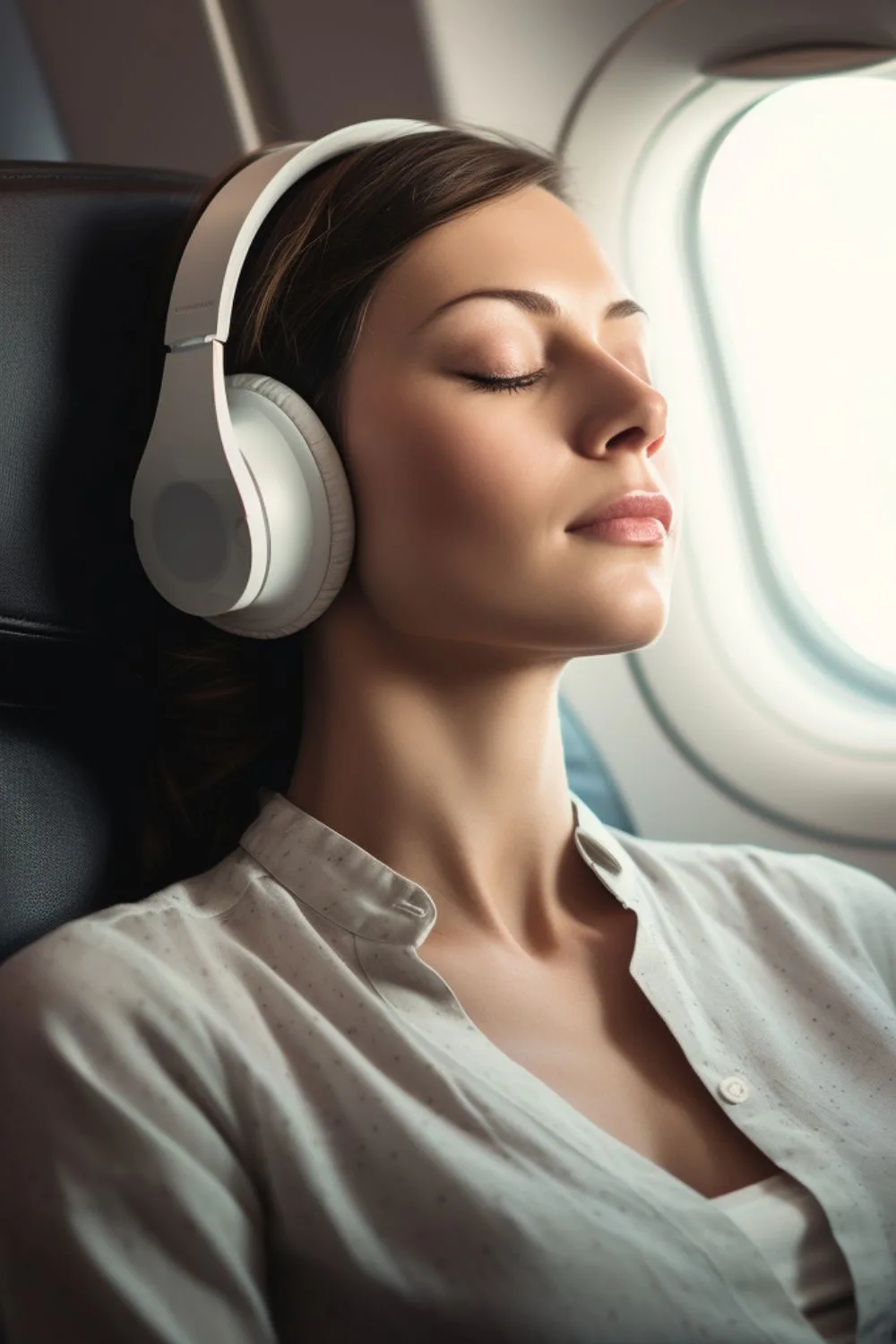
Packing Distractions and Relaxation Tools
Be sure to pack all the tools you need to relax in your carry-on bag. So many of us are digital these days, but it’s good to also pack a physical book or magazine just in case. A book of word searches or puzzles is also a good way to keep your brain busy.
Other things to keep in your bag:
- Noise-cancelling headphones to help drown out the engine noise and let you focus on your music, audiobook, or whatever you find relaxing to listen to.
- Travel pillow, or something small and squishy to help with comfort.
- A soothing scent, like peppermint essential oil, to help calm your nerves and create a soothing environment.
-
 Buy Now$9.99 ($30.27 / Fl Oz)
Buy Now$9.99 ($30.27 / Fl Oz)We earn a commission if you click this link and make a purchase at no additional cost to you.
03/07/2024 12:00 pm GMT -
 Buy Now$49.95
Buy Now$49.95We earn a commission if you click this link and make a purchase at no additional cost to you.
03/07/2024 12:10 pm GMT -
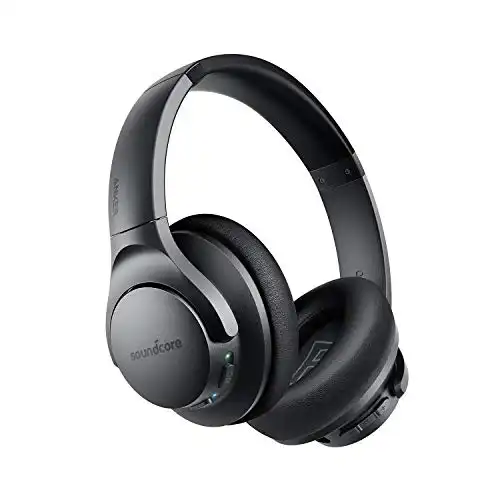 Buy Now$49.99
Buy Now$49.99We earn a commission if you click this link and make a purchase at no additional cost to you.
03/07/2024 12:20 pm GMT
My anxiety loophole: In the past, I have found that if there is someone more anxious than me, my anxiety will flip over into helpfulness and focus on helping that person. So, bring an anxious person! (Kidding)
Therapies and Treatment Options
Ask your doctor about the treatment options available for nervous travelers. A few of the options you might want to inquire about are:
Cognitive Behavioral Therapy
Cognitive Behavioral Therapy (CBT) is a popular and effective approach to help overcome your fear of flying. By identifying negative thought patterns and replacing them with more positive, rational ones, CBT aims to alter your behavior and reactions towards flying.
Exposure Therapy and Virtual Reality
Exposure therapy is a technique to face your fears gradually by exposing you to the object or situation you’re afraid of, in this case, flying. This method aims to desensitize you to the anxiety-provoking aspects of air travel.
One effective way to implement exposure therapy is through Virtual Reality (VR) simulations. With VR, you can experience a realistic flight experience in a controlled environment, allowing you to confront your fear without actually being on a plane. Some pilot training programs even offer special exposure therapy sessions for individuals suffering from aerophobia.
Hypnosis and Mindfulness
Hypnosis might help you address the underlying causes of your fear of flying by tapping into your subconscious mind. A certified hypnotist can guide you through relaxation techniques and offer suggestions for altering your perspective on air travel. It’s important to consult a professional if you’re interested in this treatment option.
Mindfulness, another therapeutic approach, focuses on staying present and fully aware of your emotions and experiences without judgment or analysis. Practicing mindfulness can be as simple as focusing on your breath or engaging in deep meditation exercises.
In-Flight Coping Strategies
Breathing and Relaxation Techniques
When experiencing anxiety or a panic attack during a flight, one of the most important things you can do is focus on your breathing. Slow, deep breaths can help lower your stress hormones and calm your mind.
Try practicing relaxation techniques like yoga and meditation before or during the flight; these methods can be incredibly beneficial in dealing with in-flight anxiety.
Distraction Techniques
Another effective way to cope with the fear of flying is to keep your mind occupied with distractions. This can range from watching movies and listening to music to reading a book or starting a conversation with your fellow passengers. The key is to find something that helps you shift your focus away from the fear and anxiety of flying.
Communicating with Flight Attendants and Pilots
Flight attendants are trained to deal with fearful and anxious passengers, so don’t hesitate to reach out to them if you’re feeling overwhelmed. They can provide reassurance about the safety of the flight and help you feel more at ease during your journey.
Additionally, consider talking to the pilots before takeoff; hearing their confidence and professionalism can help alleviate some of your fears.
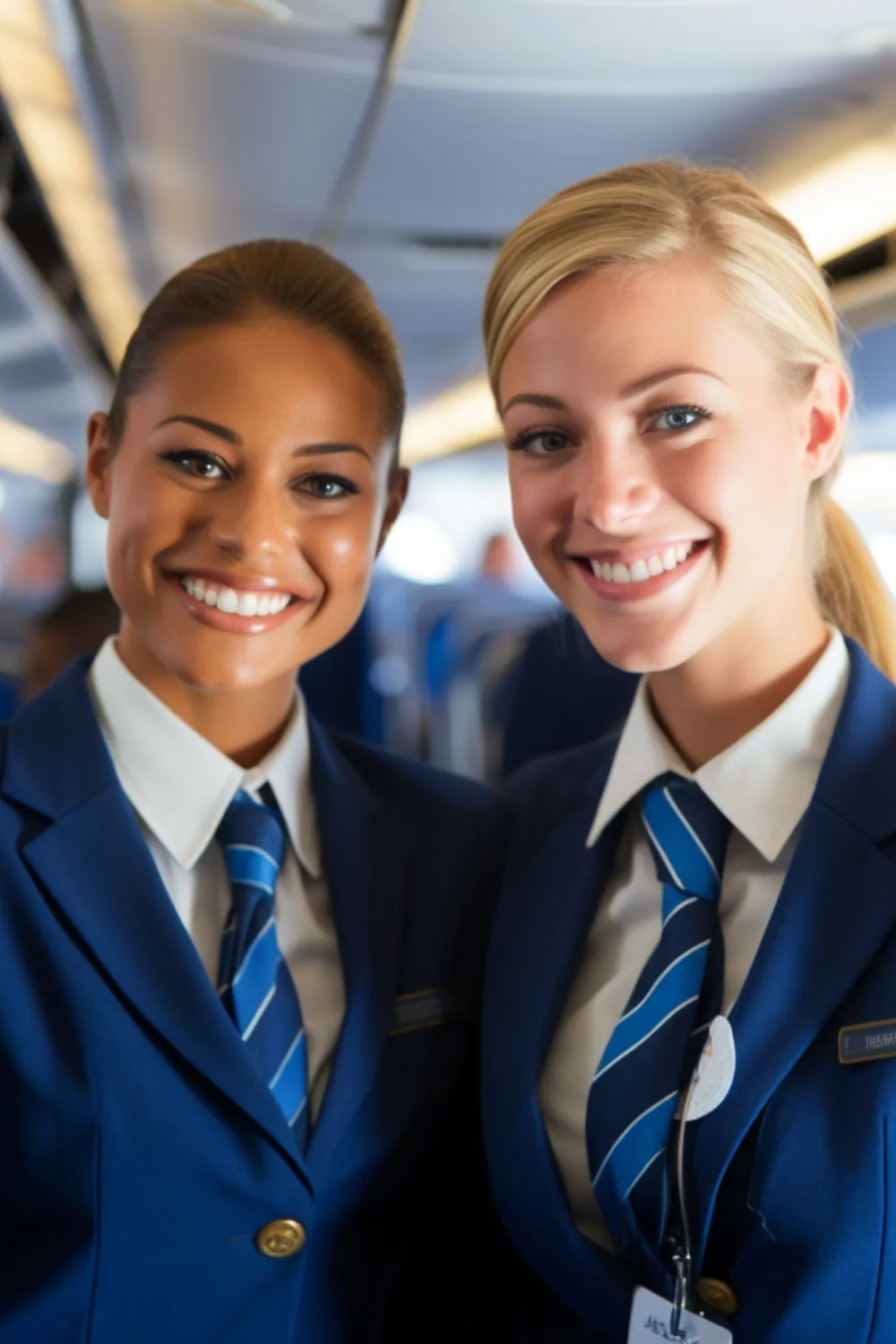
Other Considerations
Medications for Anxiety
If your fear of flying is overwhelming, consider asking your doctor about anxiety medication. They may prescribe a short-term solution to help manage your anxiety during flights. These medications should only be taken under the supervision of a healthcare professional, and it’s important to discuss potential side effects or interactions.
Avoiding Alcohol and Caffeine
When dealing with fear of any kind, it’s important to avoid alcohol and caffeine, as they could exacerbate your anxiety. Alcohol may offer temporary relief, but it can often lead to increased anxiety as its effects wear off.
Caffeine, on the other hand, can make you more jittery and heighten your stress levels. Opt for non-alcoholic, non-caffeinated beverages such as herbal tea or water during your flight to stay hydrated and maintain a more relaxed state of mind.
Frequently Asked Questions
Is fear of flying common?
Yes, fear of flying is common. Research suggests that it affects approximately 25 million adults in the U.S. Many people experience some anxiety related to flying, while others may have a more severe and debilitating phobia.
Pin this image to save and share!
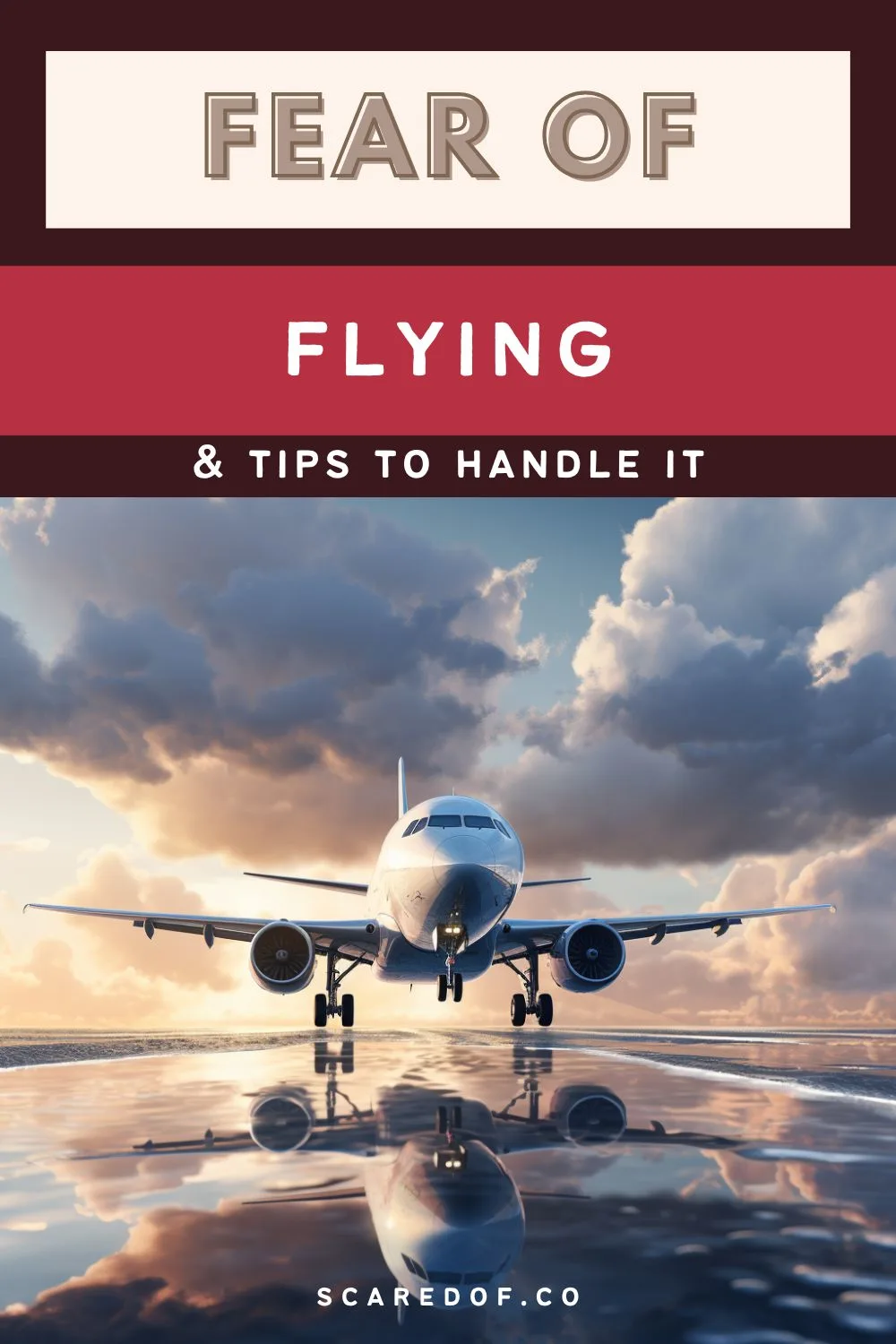
Please share any tips that help you relax on a plane and enjoy travel again!


